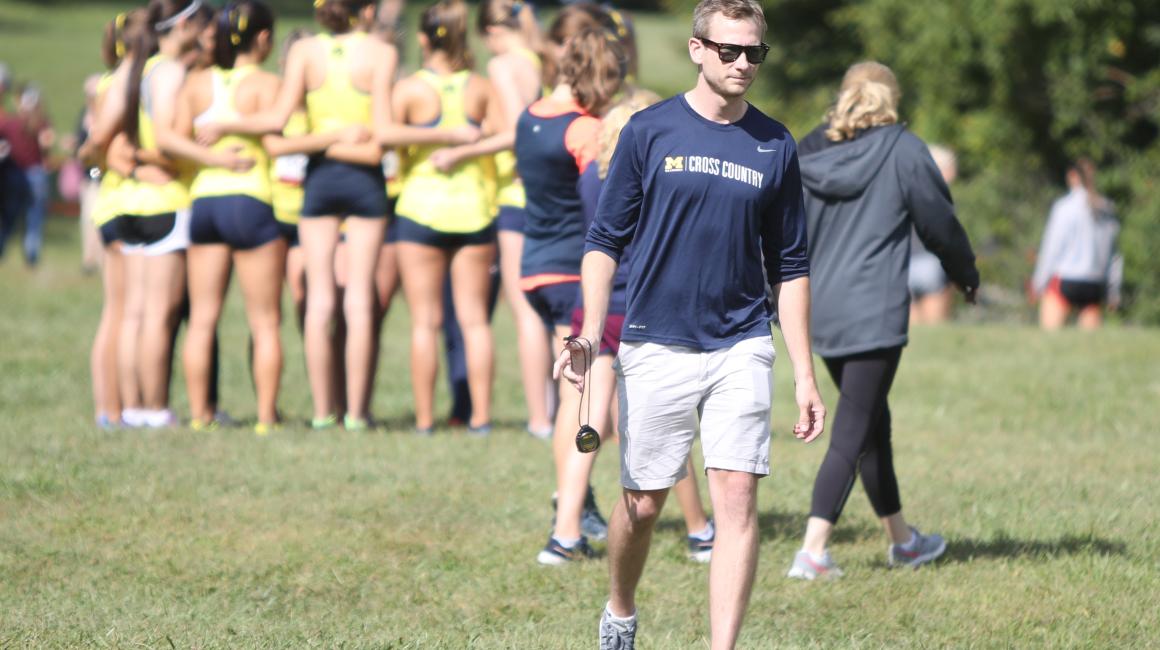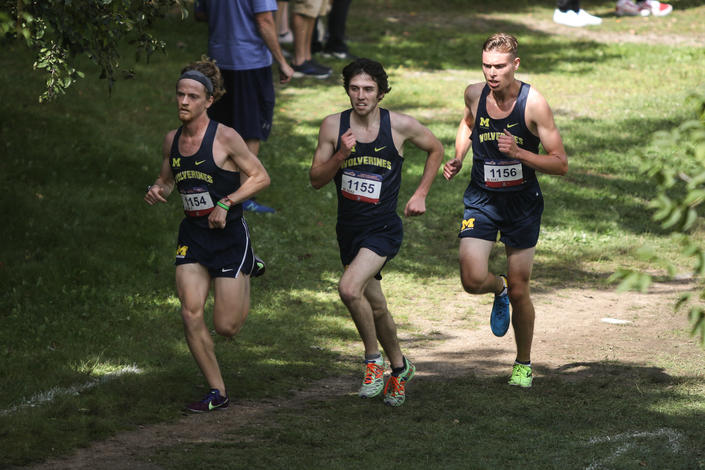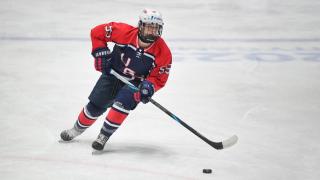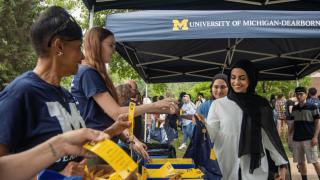
This article was originally published on April 13, 2020.
With barely enough runners to qualify for a team score, the University of Michigan-Dearborn cross-country programs began competition at the varsity level in 2011.
Through years of building and creating a culture of accountability, servant leadership and competitive drive, the Wolverine men’s and women’s teams enter their 10th season in fall 2020 with aspirations for their best campaigns to date.
With the men’s team earning its first national ranking in 2019 and the women on the verge of a breakout season, Joe Horka, who is entering his eighth season as head coach, said the goals are clear; learn to win and do what it takes to become champions.
Leadership from the Top
After two years under former Head Coach Lee Shaw, UM-Dearborn turned the cross-country teams over to Coach Horka in July 2013. He is a graduate of Madonna University where he was a standout on the Crusader cross-country team, earning the Madonna Male-Scholar Athlete of the Year award in 2007-08 and two NAIA Scholar-Athlete honors. He went on to the University of Miami (Fla.), earning his Juris Doctorate in 2011, and is currently practicing law in the metro-Detroit area.
In his time with the Wolverines, the programs have continued to reach new levels of success on race day, in the classroom, and in the community. To date, UM-Dearborn cross country has totaled of 42 WHAC All-Academic Team awards, 21 NAIA Scholar-Athletes, four All-Conference honorees, four WHAC Runner of the Week honors and three Chancellor’s Awards, along with multiple additional honors throughout the years for academics, performance and community leadership.
“Joe (Horka) is a great leader and without his efforts, nothing we have accomplished would be possible,” UM-Dearborn junior runner Caitlyn Hynek said. “He works with the top runners the same amount as everyone on the team. He wants us to be great and puts us in position to accomplish our goals.”
Hynek said she is self-aware about her abilities, knowing that she is never going to be the fastest on the team. She walked on for her freshman season and nearly quit after day one. However, Horka convinced her to stick with it and Hynek now understands the value it has added to her time at UM-Dearborn.
The Early Years
The Wolverine cross-country programs began competing as a club program in the mid-2000s, offering UM-Dearborn students the opportunity to continue their competitive running careers at the college level. Cross-country was one of the first sports added to the roster of varsity programs during the expansion of the last 12 years of UM-Dearborn athletics.
With the elevation to varsity status, UM-Dearborn was able to begin recruiting runners to the school with the chance to receive athletic financial aid. The first few seasons brought tempered growth, with several holdovers from the club teams laying the foundation for the future.
In the team’s inaugural season of competition, UM-Dearborn earned its first national qualifier, as Joan Stoian received a bid to the 2011 NAIA Women’s Cross Country National Championship. Stoian also became the first Wolverine runner to earn a Wolverine-Hoosier Athletic Conference postseason award, named to the 2011 All-WHAC Second Team.
Over the next several seasons, Horka dealt with retention issues, as student-athletes transferred or decided not to continue with the sport. The team continued to build and with renewed support for athletics from the University, the cross-country programs began to take steps towards the top of the WHAC. The foundation was laid by names such as Quinn Osgood, Ryan Pickell, Mallory Nemeth and Megan McDonald, all of whom went on to become assistant coaches under Horka for the Wolverines, helping maintain a consistent culture.
Recruiting Wolverines
College cross-country runners typically have a different experience than that of an average student-athlete. At the majority of institutions in the NAIA and across all levels of intercollegiate competition, being a cross-country runner means that you are also expected to join the institution’s track and field team. With indoor and outdoor seasons taking place in the winter and spring months, in addition to a cross country schedule in the fall, the demand on a student-athlete’s time is unyielding, with competition stretching almost continuously from August into May each year.
At this time, UM-Dearborn does not offer track and field, a circumstance that Horka has found a niche for recruiting a certain type of student-athlete.
“It is in a way a blessing,” Horka said. “Not being a year-round athlete allows our students to take advantage of opportunities in the classroom, internships and part-time jobs. Our athletes do have practices in the spring, and are expected to train throughout the year, but we can prioritize one season, giving student-athletes the time to take advantage of a full college experience."
Horka admits that there are a percentage of recruits that dismiss UM-Dearborn at the start due to the lack of track and field team. If the future does hold the addition of track and field at UM-Dearborn, Horka and his staff are confident that the Wolverines could quickly become a contender in the NAIA given the popularity and depth of talent in the southeast Michigan region.
“Our low-cost tuition and high standard of education could make us a very attractive destination to student-athletes that are right now choosing the expensive route of private-schools to be able to continue their track and field careers,” Horka added.
Trending Higher

With the expansion of available scholarships, Horka was able to push the Wolverines forward starting in 2017 with a strong recruiting class on both sides, with the inclusion of Josh Mussen who became the first UM-Dearborn men’s runner to qualify for the NAIA National Championships in his freshman season. The same season brought a strong core of women’s runners, led by Victoria Hebda, who has paced the UM-Dearborn women’s program for the past three seasons.
The following season, Horka was able to bring in his strongest recruiting class on the men’s side. Ryan Exell, an NAIA National Championship qualifier in each of his first two seasons, led the group. Exell holds the team record in an 8k, which he set in 2018 and later broke in 2019. He was named the 2018 WHAC Newcomer of the Year and was the program’s first All-WHAC First Team honoree in 2019 with a program best fifth-place showing at the league championship meet. The 2018 season also saw Wolverines capture their first ever team event title at the 2018 Lansing Invitational.
When asked what moment the men shifted from a middle-of-the-pack team to a contender, Horka highlighted the Louisville Classic in 2019 where the Wolverines finished sixth-out-of-37 teams, a field that included some of the NAIA’s top programs. UM-Dearborn earned its first national ranking in the NAIA Top-25 Poll the next week, a landmark moment for the Wolverines.
"We had to make a big statement because we weren't really on anyone's radar," Horka said. “The Louisville performance that earned us the ranking was the best day that the program had to date. We earned it that day.”
Following the team’s first ranking, the UM-Dearborn men entered the WHAC Championship with its eyes on a team title, but fell short. The disappointing result was another wake-up call for the team, as now they know just how good they have to be as a team to get where they want to go.
“It was the first time that we were in a playoff atmosphere,” Horka said about the final month of the 2019 men’s season. “Having beat teams that were previously out of reach. We get that it is a process. We understand that winning is not easy.”
Getting Ahead of the Pack for the Future
Horka is excited to get back to work with his team and assistant coaches for the 2020 season, as his latest recruiting class could be one of the best he has seen, adding depth to a group of high-caliber returners.
The coaches are confident that both teams are closing in on bids to the NAIA National Championships. Osgood added that the team has shifted how it approaches a season. Instead of just trying to fill a schedule with events that are local and budget friendly, the Wolverines are seeking out the competition that will help the program position itself for the postseason.
“We want to get better every year,” Horka said. “Not up and down. Consistent upward trending. National appearances for both teams and consistent rankings. Get a team in the top-10 at UM-Dearborn. We are working toward that goal.”
Always better today than yesterday; that is the culture for UM-Dearborn cross-country.



